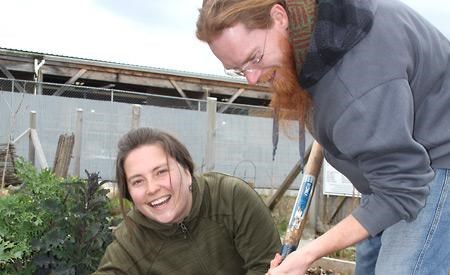Two local small-scale farmers are challenging residents to start growing in their backyards to help reach the goal of 106 acres of local food production.
Routes to Roots Edibles owners Julia Adam and Rob Hughes’ 106-Acre Challenge aims to encourage local food production and raise awareness over food sustainability. From a rough calculation, the couple estimated it would take 106 acres of vegetable gardens to feed the Powell River region and its roughly 22,000 residents for a year.
The calculations came from determining how much vegetable produce can be grown in a square foot of garden space and how many people that can sustain for how long. Their figure does not include land used for raising livestock or growing grains, but they hope to be able to include that information into the overall figure in the future. This starting point makes sense too because most people who decide to grow their own food will start with vegetables.
To achieve this goal, every person in the area would need to have a vegetable plot of 12 by 20 feet. The pair recognizes not everyone will jump on board but the number is an average and for every person who doesn’t grow they hope to have a person with a 24 by 40 plot making up for it. Even if a person doesn’t grow, the challenge encourages people to buy vegetables from local producers and farmers’ markets in order to support the cause.
“The idea just sort of came over nights and nights of talking about the thing that we love most. It’s not this carved out, organized thing,” said Adam. “It’s that little elbow to us all to ask ‘Can I grow food? Can I grow more? Can I support my neighbour in growing food?’”
Adam and Hughes believe these kinds of initiatives are important because we as a culture are becoming disconnected with our food. They see such disconnection also leading to a separation from our health and our relationships with each other and our community. They also believe that it’s important and healthy for children to grow up around food production and to have an understanding of that connection between the earth and life.
The challenge asks participants to go online, www.rtredibles.ca, to register the size of land they are growing on. At the time of writing 8.8 acres have been registered, leaving 97.2 acres to go. There is no time limit on the challenge; it’s more of a longterm goal than a race. However, they do encourage anyone who grows vegetables, from a commercial growing operation to someone with a few tomato plants in the backyard, to get online and be counted.
“We’re lucky because we have the space here,” said Hughes. “As cities go Powell River is pretty rural in its land mass...it’s totally feasible for everyone to have a garden in their backyard.”
Adam and Hughes are also using the campaign to promote small-scale food production. They see it as the answer to food security concerns as well as to environmental concerns that come from mainstream farming practices along with long-distance transportation of food. Backyard gardens, small-scale farmers, community gardens, co-ops and other local forms of food production result in a reduced dependence on imported foods and build the local food economy.
“You don’t have to have a green thumb, it’s not rocket science. There are things that you need to know but it’s not as daunting as it’s made to sound,” said Hughes. “It wasn’t that long ago that every single backyard had a garden in it to sustain the continent and we’ve moved away from that with large-scale commercial agriculture and going to the supermarket. But, we’re seeing the flaws in that whole system.”
They believe our modern method of food production has only arisen over the past 100 years or so and that we need to look back further than that to find growing techniques that were sustainable. At the same time, Adam and Hughes recognize the environment has changed, the population has grown, there’s more urban sprawl and that creativity is needed to take the old growing practices and reinvent them for modern times.
When it comes down to the question of what’s more important, organic or local, both Adam and Hughes reluctantly answer local, because small-scale farming typically lends itself to organic growing anyway, whereas it doesn’t really work the other way. With small-scale gardening they say it really doesn’t make sense, nor is it cost-efficient, to use industrial fertilizers or pesticides. Doing so won’t necessarily lead to a higher yield once people know the basics about what they are doing.
They recommend lettuce, green onions, garlic, beans, zucchini and tomatoes as good starting vegetables for people to grow because they grow well here and require the minimal amount of knowledge and work to grow successfully. Adam and Hughes are also marketing an all-in-one veggie garden kit that will provide all the materials needed to start a small garden, including a workshop and a guide.
“If we’re thinking about small-scale food production,” said Adam, “and feeding the planet in a way that we can feel good about, and that is good to us, then it’s kind of a nice challenge.”



